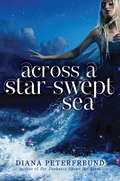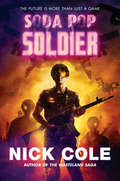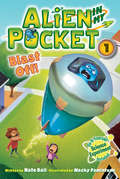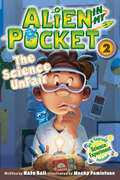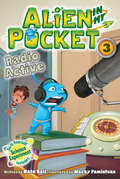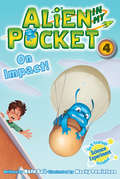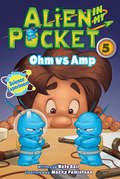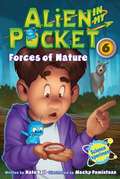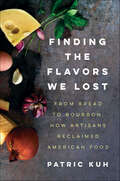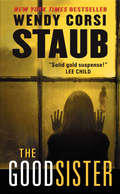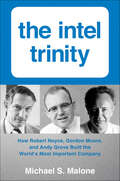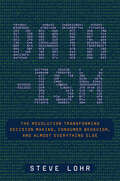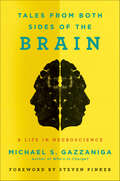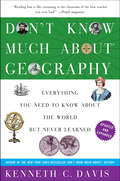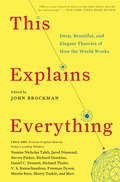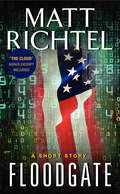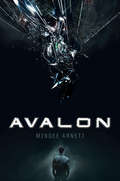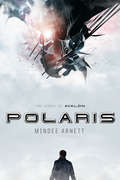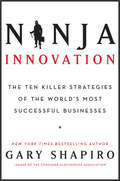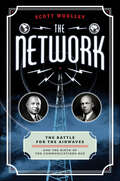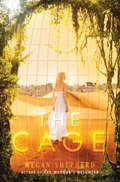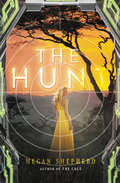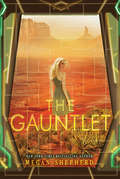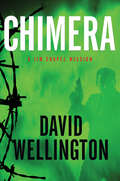- Table View
- List View
Across a Star-Swept Sea
by Diana PeterfreundFrom Rampant and Ascendant author Diana Peterfreund comes this thrilling companion to For Darkness Shows the Stars. Centuries after wars nearly destroyed civilization, Persis Blake's world is once again in the throes of rebellion. For Persis, her public life is that of a socialite, filled with parties and ball gowns. But while she seems to be a frivolous aristocrat, inside Persis beats the heart of a spy—the same heart that is falling for the enemy, Justen Helo. Persis's heart belongs to Justen, but before she can tell him the truth, she discovers he has a secret as well—one that could plunge their tropical paradise into another dark age. And Persis realizes she's not just risking her heart, she's risking the world she's sworn to protect. Across a Star-Swept Sea is a romantic, science-fictional reimagining of the classic The Scarlet Pimpernel.
Soda Pop Soldier
by Nick ColeWhen the virtual world gets real . . .Gamer PerfectQuestion fights for ColaCorp in WarWorld, an online combat-sport arena where megacorporations field entire armies in the battle for dominance over real-world global-advertising space. Within the immense virtual battlefield, players and bots are high-tech grunts, using dropships and state-of-the-art assault rifles to attack the enemy.But when times are tough, there's always the Black, an illegal open-source tournament where the sick and twisted desires of the future are given free reign. And what begins as PerfectQuestion's onetime effort to make some cash quickly turns dangerous.All too soon, the real and virtual worlds collide when PerfectQuestion refuses to become the tool of a madman intent on hacking the global economy for himself and fights to stay alive--in WarWorld, in the Black, and in the real world.
Alien in My Pocket: Blast Off!
by Macky Pamintuan Nate BallThe adventure begins in this exciting new chapter book series, complete with a do-it-yourself science experiment! When a four-inch-tall alien crash-lands through Zack McGee's bedroom window, Zack is sure he's about to become the first victim in a new War of the Worlds. But when the alien turns out to have weapons that are more ticklish than terrifying, Zack realizes that rather than protect the world from the alien it's up to him to protect the alien in his pocket from the world.With illustrations on every spread, a how-to on launching a rocket, fun scientific facts, and the hilarious adventures of Zack and Amp, this book is the perfect gift for any young reader!Supports the Common Core State Standards
Alien in My Pocket: The Science UnFair
by Macky Pamintuan Nate BallThe must-read second book in the Alien in My Pocket series. Zack and Amp are back and up to even more trouble in this hilarious story, complete with a do-it-yourself science experiment!Ever since Amp crash-landed his spaceship through Zack McGee's bedroom window, Zack's life has gotten crazier and his grades have gone from bad to worse. Who has time for homework when there's an alien invasion to stop? But now Zack's up against his greatest challenge yet--the school science fair. If Zack doesn't get an A on his project, he's going to flunk the class. Luckily, Zack has Amp around to help, but when Zack's experiment turns out to be too good, he winds up in a whole different kind of trouble.Complete with many illustrations, a riveting plot, and fun scientific facts, this book is perfect for young readers!Supports the Common Core State Standards
Alien in My Pocket #3: Radio Active
by Macky Pamintuan Nate BallThis third book in the Alien in My Pocket series is the zaniest yet! Zack and Amp create a massive mishap in this hilarious story. Plus the book comes with a do-it-yourself science experiment.Nothing's been easy since Amp crash-landed his spaceship through Zack McGee's bedroom window. Now Amp has built a quantum radio to alert his commanders to call off the invasion of Earth. Unfortunately, instead of contacting Erdian Central Command, Amp's radio accidentally broadcasts Amp's messages all over Zack's hometown. Now it's up to Zack and his best friend, Olivia, to save their alien friend from being discovered and to save the planet from panic.With illustrations throughout, a page-turning plot, and fun scientific facts, this is the perfect chapter book for young readers. Supports the Common Core State Standards.
Alien in My Pocket #4: On Impact!
by Macky Pamintuan Nate BallThis must-read Alien in My Pocket book is the fourth in the series by Nate Ball, the host of PBS's Design Squad and Design Squad Nation. In this hilarious new adventure, Zack and his alien friend, Amp, learn about friction, deceleration, and how to soften a crash-landing.When Zack McGee crashes his bike, he's stuck at home with his arm in a sling and his baseball season on the line. What's worse, his bike crashed because his four-inch-tall houseguest, Amp, experimented on the brakes! Now Zack is easy prey for his little brother, Taylor, who's determined to find out once and for all what mysteries Zack has hidden in his pocket.Like every book in the Alien in My Pocket series, On Impact! mixes Common Core-aligned science and safe, hands-on experiments with a hilarious story that young readers will love.Publishers Weekly said of Alien in My Pocket: Blast Off!: "With its screwball comedy and lively dialogue, the novel gives readers the opportunity to laugh as they learn."Supports the Common Core State Standards
Alien in My Pocket #5: Ohm vs. Amp
by Macky Pamintuan Nate BallZack and Amp get a serious surprise in the fifth installment of this intergalactic chapter book series by Nate Ball, the host of PBS's Design Squad and Design Squad Nation. Zack and his alien friend, Amp, discover that leverage can be an Earth-saving thing when they build a rocket-launching atlatl!Zack McGee's life has been filled with trouble since Amp, a four-inch-tall alien scout, crash-landed into Zack's bedroom. But now it's Amp's turn to be in the hot seat. When his commander, Ohm, arrives to take Amp back home, the aliens feud. Amp has to get his cranky counterpart off Earth before they all end up in a world of trouble!Like every book in the Alien in My Pocket series, Ohm vs. Amp mixes Common Core-aligned science, and safe, hands-on experiments with a hilarious story that young readers will love.Publishers Weekly said of Alien in My Pocket: Blast Off!: "With its screwball comedy and lively dialogue, the novel gives readers the opportunity to laugh as they learn."Correlates to the Common Core State Standards in English Language Arts
Alien in My Pocket #6: Forces of Nature
by Macky Pamintuan Nate BallZack and Amp get a serious surprise in Forces of Nature, the sixth installment of this fun intergalactic chapter book series by Nate Ball, the host of PBS's Design Squad and Design Squad Nation.Ever since Amp crash-landed his spaceship through Zack McGee's window, Zack's life has gone in some unexpected directions. But when everything goes wrong on the McGee family camping trip, Zack's going to need Amp's alien scouting skills to navigate the great outdoors and find their way back to civilization!Like every book in the Alien in My Pocket series, Forces of Nature mixes Common Core-aligned science with safe, hands-on experiments that young readers will love. This installment includes a build-your-own compass experiment.Publishers Weekly said of Alien in My Pocket: Blast Off!: "With its screwball comedy and lively dialogue, the novel gives readers the opportunity to laugh as they learn."
Finding the Flavors We Lost: From Bread to Bourbon, How Artisans Reclaimed American Food
by Patric KuhThe multiple-James Beard Award–winning restaurant critic for Los Angeles Magazine delivers an arresting exploration of our cultural demand for “artisanal” foods in a world dominated by corporate agribusiness.We hear the word “artisanal” all the time—attached to cheese, chocolate, coffee, even fast-food chain sandwiches—but what does it actually mean? We take “farm to table” and “handcrafted food” for granted now but how did we get here? In Finding the Flavors We Lost, acclaimed food writer Patric Kuh profiles major figures in the so-called “artisanal” food movement who brought exceptional taste back to food and inspired chefs and restaurateurs to redefine and rethink the way we eat.Kuh begins by narrating the entertaining stories of countercultural “radicals” who taught themselves the forgotten crafts of bread, cheese, and beer-making in reaction to the ever-present marketing of bland, mass-produced food, and how these people became the inspiration for today’s crop of young chefs and artisans. Finding the Flavors We Lost also analyzes how population growth, speedier transportation, and the societal shifts and economic progress of the twentieth century led to the rise of supermarkets and giant food corporations, which encouraged the general desire to swap effort and quality for convenience and quantity.Kuh examines how a rediscovery of the value of craft and individual effort has fueled today’s popularity and appreciation for artisanal food and the transformations this has effected on both the restaurant menu and the dinner table. Throughout the book, he raises a host of critical questions. How big of an operation is too big for a food company to still call themselves “artisanal”? Does the high cost of handcrafted goods unintentionally make them unaffordable for many Americans? Does technological progress have to quash flavor? Eye-opening, informative, and entertaining, Finding the Flavors We Lost is a fresh look into the culture of artisan food as we know it today—and what its future may be.
The Good Sister
by Wendy Corsi StaubIn New York Times bestselling authorWendy Corsi Staub's electrifying new thriller,a mother races to save her daughter beforeher darkest nightmare comes true. Sacred Sisters Catholic girls' school has hardly changed since Jen Archer was a student. Jen hoped her older daughter would thrive here. Instead, shy, studious Carley becomes the target of vicious bullies. But the real danger at Sacred Sisters goes much deeper. The only person Carley can talk to is "Angel," a kindred spirit she met online. Carley tells Angel everything—about her younger sister, about school, about the sudden death of her former best friend. Angel is her lifeline. And Angel is closer than she knows. When another schoolgirl is found dead, Jen's unease grows. There are too many coincidences, too many links to her past. Every instinct tells her that Carley is the next target. For someone is intent on punishing the guilty, teaching the ultimate lesson in how to fear . . . and how to die.
The Good Sister
by Wendy Corsi StaubIn New York Times bestselling authorWendy Corsi Staub's electrifying new thriller,a mother races to save her daughter beforeher darkest nightmare comes true. Sacred Sisters Catholic girls' school has hardly changed since Jen Archer was a student. Jen hoped her older daughter would thrive here. Instead, shy, studious Carley becomes the target of vicious bullies. But the real danger at Sacred Sisters goes much deeper.The only person Carley can talk to is "Angel," a kindred spirit she met online. Carley tells Angel everything--about her younger sister, about school, about the sudden death of her former best friend. Angel is her lifeline. And Angel is closer than she knows.When another schoolgirl is found dead, Jen's unease grows. There are too many coincidences, too many links to her past. Every instinct tells her that Carley is the next target. For someone is intent on punishing the guilty, teaching the ultimate lesson in how to fear . . . and how to die.
The Intel Trinity: How Robert Noyce, Gordon Moore, and Andy Grove Built the World's Most Important Company
by Michael S. MaloneBased on unprecedented access to the corporation’s archives, The Intel Trinity is the first full history of Intel Corporation—the essential company of the digital age— told through the lives of the three most important figures in the company’s history: Robert Noyce, Gordon Moore, and Andy Grove.Often hailed the “most important company in the world,” Intel remains, more than four decades after its inception, a defining company of the global digital economy. The legendary inventors of the microprocessor-the single most important product in the modern world-Intel today builds the tiny “engines” that power almost every intelligent electronic device on the planet.But the true story of Intel is the human story of the trio of geniuses behind it. Michael S. Malone reveals how each brought different things to Intel, and at different times. Noyce, the most respected high tech figure of his generation, brought credibility (and money) to the company’s founding; Moore made Intel the world’s technological leader; and Grove, has relentlessly driven the company to ever-higher levels of success and competitiveness. Without any one of these figures, Intel would never have achieved its historic success; with them, Intel made possible the personal computer, Internet, telecommunications, and the personal electronics revolutions.The Intel Trinity is not just the story of Intel’s legendary past; it also offers an analysis of the formidable challenges that lie ahead as the company struggles to maintain its dominance, its culture, and its legacy.With eight pages of black-and-white photos.
Data-ism: The Revolution Transforming Decision Making, Consumer Behavior, and Almost Everything Else
by Steve Lohr“Lohr uses his Pulitzer Prize-winning reporting skills to dig into and explain the power, pervasiveness, and potential downside of big data.” —Library JournalIn Data-ism, New York Times reporter Steve Lohr explains how big-data technology is ushering in a revolution in proportions that promise to be the basis of the next wave of efficiency and innovation across the economy. But more is at work here than technology. Big data is also the vehicle for a point of view, or philosophy, about how decisions will be—and perhaps should be—made in the future. Lohr investigates the benefits of data while also examining its dark side.Data-ism is about this next phase, in which vast Internet-scale data sets are used for discovery and prediction in virtually every field. It shows how this new revolution will change decision making—by relying more on data and analysis, and less on intuition and experience—and transform the nature of leadership and management. Focusing on young entrepreneurs at the forefront of data science as well as on giant companies such as IBM that are making big bets on data science for the future of their businesses, Data-ism is a field guide to what is ahead, explaining how individuals and institutions will need to exploit, protect, and manage data to stay competitive in the coming years. With rich examples of how the rise of big data is affecting everyday life, Data-ism also raises provocative questions about policy and practice that have wide implications for everyone.The age of data-ism is here. But are we ready to handle its consequences, good and bad?
Tales from Both Sides of the Brain: A Life in Neuroscience
by Michael S. GazzanigaMichael S. Gazzaniga, one of the most important neuroscientists of the twentieth century, gives us an exciting behind-the-scenes look at his seminal work on that unlikely couple, the right and left brain. Foreword by Steven Pinker.In the mid-twentieth century, Michael S. Gazzaniga, “the father of cognitive neuroscience,” was part of a team of pioneering neuroscientists who developed the now foundational split-brain brain theory: the notion that the right and left hemispheres of the brain can act independently from one another and have different strengths.In Tales from Both Sides of the Brain, Gazzaniga tells the impassioned story of his life in science and his decades-long journey to understand how the separate spheres of our brains communicate and miscommunicate with their separate agendas. By turns humorous and moving, Tales from Both Sides of the Brain interweaves Gazzaniga’s scientific achievements with his reflections on the challenges and thrills of working as a scientist. In his engaging and accessible style, he paints a vivid portrait not only of his discovery of split-brain theory, but also of his comrades in arms—the many patients, friends, and family who have accompanied him on this wild ride of intellectual discovery.
Don't Know Much About Geography: Everything You Need to Know About the World but Never Learned (The Don't Know Much About Series)
by Kenneth C. DavisAn “entertaining [and] eminently readable” exploration of our home planet from the New York Times–bestselling author of Don’t Know Much About History(Publishers Weekly).Geography is much more than naming countries on a map or memorizing state capitals. It’s the hub from which other disciplines radiate: meteorology, ecology, geology, oceanography, demographics, cartography, agricultural studies, economics, and political science. Yet many of us don’t know much about it. This fun and fascinating guide can change that!In addition to presenting plenty of geographical trivia to impress your friends, Kenneth C. Davis explores 21st-century topics of global concern, including the role of the Internet and technology in transforming the lives of people around the world, how so-called developing nations develop, sustainability, and debates over climate change and evolutionary science. This completely revised and updated version of Don't Know Much About Geography is an illuminating grand tour of planet Earth.“Reading [Kenneth C. Davis] is like returning to the classroom of the best teacher you ever had.” —PeopleA School Library Journal “Must-Read”
This Explains Everything: 150 Deep, Beautiful, and Elegant Theories of How the World Works (Edge Question Series)
by John BrockmanDrawn from the cutting-edge frontiers of science, This Explains Everything will revolutionize your understanding of the world.What is your favorite deep, elegant, or beautiful explanation? This is the question John Brockman, publisher of Edge.org ("The world's smartest website"--The Guardian), posed to the world's most influential minds. Flowing from the horizons of physics, economics, psychology, neuroscience, and more, This Explains Everything presents 150 of the most surprising and brilliant theories of the way of our minds, societies, and universe work.Jared Diamond on biological electricity * Nassim Nicholas Taleb on positive stress * Steven Pinker on the deep genetic roots of human conflict * Richard Dawkins on pattern recognition * Nobel Prize-winning physicist Frank Wilczek on simplicity * Lisa Randall on the Higgs mechanism * BRIAN Eno on the limits of intuition * Richard Thaler on the power of commitment * V. S. Ramachandran on the "neural code" of consciousness * Nobel Prize winner ERIC KANDEL on the power of psychotherapy * Mihaly Csikszentmihalyi on "Lord Acton's Dictum" * Lawrence M. Krauss on the unification of electricity and magnetism * plus contributions by Martin J. Rees * Kevin Kelly * Clay Shirky * Daniel C. Dennett * Sherry Turkle * Philip Zimbardo * Lee Smolin * Rebecca Newberger Goldstein * Seth Lloyd * Stewart Brand * George Dyson * Matt Ridley
Floodgate
by Matt RichtelIt's Watergate. On servers. On the eve of the presidential election, a conspiracy threatens to alter the outcome of the vote—and the future of American politics. At the heart of the plot is a powerful computer program, aimed at rooting out hypocrisy among politicians to expose their truths . . . and ours. Left to unravel the conspiracy is a bitter, hotheaded former journalist, but he's just not sure he cares enough to get to the bottom of it.
Avalon
by Mindee ArnettFor fans of Josh Whedon's cult classic television show Firefly comes a fascinating and fast-paced sci-fi thriller from author Mindee Arnett, about a group of teenage mercenaries who stumble upon a conspiracy that threatens the entire galaxy.Jeth Seagrave and his crew have made their name stealing metatech: the devices that allow people to travel great distances faster than the speed of light. In a world where the agencies that patrol the outer edges of space are as corrupt as the crime bosses who control them, it's as much of a living as anyone can ask for. For years Jeth's managed to fly under the radar of the government that executed his parents for treason--but when he finds himself in possession of information that both government and the crime bosses are willing to kill for, he's going to find there's no escaping his past anymore.With pulse-pounding action, a captivating mystery, and even a bit of romance, Avalon is the perfect read for hard-core sci-fi fans and non-sci-fi fans alike.
Polaris
by Mindee ArnettJeth Seagrave and his crew of mercenaries are pulled into one last high-stakes mission in this breathtaking sequel to Mindee Arnett's Avalon, which SLJ called, in a starred review, "an exciting piece of science fiction that keeps up its energy from beginning to end."Jeth Seagrave and his crew are on the run. The ITA, still holding Jeth's mother in a remote research lab, is now intent on acquiring the metatech secrets Jeth's sister Cora carries inside her DNA, and Jeth is desperate to find the resources he needs to rescue his mother and start a new life outside the Confederation. But the ITA is just as desperate, and Jeth soon finds himself pursued by a mysterious figure hell-bent on capturing him and his crew--dead or alive.With nowhere to run and only one play left, Jeth enters into a bargain with the last person he ever thought he'd see again: Daxton Price, the galaxy's newest and most fearsome crime lord. Dax promises to help Jeth, but his help will only come at a price--a price that could mean sacrificing everything Jeth has fought for until now.
Ninja Innovation: The Ten Killer Strategies of the World's Most Successful Businesses
by Gary ShapiroInnovate or dieFor thirty years, Gary Shapiro has observed the world's most innovative businesses from his front-row seat as leader of the Consumer Electronics Association. Now he reveals the ten secrets of "ninja innovators" like Apple, Amazon, Google, Microsoft, and many others.What does it take to succeed? Discipline. Mission-oriented strategy. Adaptability. Decisiveness. And a will for victory. In short, today's most successful businesses are "ninja innovators." Drawn from Gary Shapiro's three decades of experience leading the consumer electronics industry, Ninja Innovation takes readers behind the scenes of today's top enterprises, uncovering their ten essential strategies for success.As head of the Consumer Electronics Association and its influential annual trade show, the International CES, Shapiro has worked with the most innovative companies in history—Intel, IBM, and Samsung, to name a few—focusing on creating policies and events that produce revolutionary products year after year. He has learned the key strategies that have guided these businesses to record-breaking profits, as well as the traps that have led so many others to crushing failure. In order to stay in front of the pace of innovation, Shapiro observes, top companies must operate as an elite strike force—just like the legendary medieval warriors known as ninjas. Ninjas weren't called upon to do the ordinary; they had to perform truly extraordinary tasks, while risking everything. As a highly trained martial-arts black belt himself, Shapiro mines the valuable insights of these centuries-old warriors to spotlight the secrets of agility, creativity, decisiveness, and reinvention that are essential for twenty-first-century leaders seeking breakthrough success. Taking readers inside the most cutting-edge businesses, Ninja Innovation is the ultimate guide to achieving victory in today's innovate-or-die economy.
The Network: The Battle for the Airwaves and the Birth of the Communications Age
by Scott WoolleyThe astonishing story of America’s airwaves, the two friends—one a media mogul, the other a famous inventor—who made them available to us, and the government which figured out how to put a price on air.This is the origin story of the airwaves—the foundational technology of the communications age—as told through the forty-year friendship of an entrepreneurial industrialist and a brilliant inventor.David Sarnoff, the head of RCA and equal parts Steve Jobs, Jack Welch, and William Randolph Hearst, was the greatest supporter of his friend Edwin Armstrong, developer of the first amplifier, the modern radio transmitter, and FM radio. Sarnoff was convinced that Armstrong’s inventions had the power to change the way societies communicated with each other forever. He would become a visionary captain of the media industry, even predicting the advent of the Internet.In the mid-1930s, however, when Armstrong suspected Sarnoff of orchestrating a cadre of government officials to seize control of the FM airwaves, he committed suicide. Sarnoff had a very different view of who his friend’s enemies were.Many corrupt politicians and corporations saw in Armstrong’s inventions the opportunity to commodify our most ubiquitous natural resource—the air. This early alliance between high tech and business set the precedent for countless legal and industrial battles over broadband and licensing bandwidth, many of which continue to influence policy and debate today.
The Cage
by Megan ShepherdThe Maze Runner meets Scott Westerfeld in this gripping new series about teens held captive in a human zoo by an otherworldly race. From Megan Shepherd, the acclaimed author of The Madman's Daughter trilogy.When Cora Mason wakes in a desert, she doesn't know where she is or who put her there. As she explores, she finds an impossible mix of environments--tundra next to desert, farm next to jungle, and a strangely empty town cobbled together from different cultures--all watched over by eerie black windows. And she isn't alone.Four other teenagers have also been taken: a beautiful model, a tattooed smuggler, a secretive genius, and an army brat who seems to know too much about Cora's past. None of them have a clue as to what happened, and all of them have secrets. As the unlikely group struggles for leadership, they slowly start to trust each other. But when their mysterious jailer--a handsome young guard called Cassian--appears, they realize that their captivity is more terrifying than they could ever imagine: Their captors aren't from Earth. And they have taken the five teenagers for an otherworldly zoo--where the exhibits are humans.As a forbidden attraction develops between Cora and Cassian, she realizes that her best chance of escape might be in the arms of her own jailer--though that would mean leaving the others behind. Can Cora manage to save herself and her companions? And if so . . . what world lies beyond the walls of their cage?
The Hunt (Cage #2)
by Megan ShepherdThe Maze Runner meets Scott Westerfeld in the second novel in this gripping and romantic YA series about teens abducted from Earth by an otherworldly race--from Megan Shepherd, the acclaimed author of the Madman's Daughter series.They've left the cage--but they're not free yet.After their failed escape attempt, Cora, Lucky, and Mali have been demoted to the lowest level of human captives and placed in a safari-themed environment called the Hunt, along with wild animals and other human outcasts. They must serve new Kindred masters--Cora as a lounge singer, Lucky as an animal wrangler, and Mali as a safari guide--and follow new rules or face dangerous consequences. Meanwhile, Nok and Rolf have been moved into an enormous dollhouse, observed around the clock by Kindred scientists interested in Nok's pregnancy. And Leon, the only one who successfully escaped, has teamed up with villainous Mosca black-market traders.The former inhabitants of the Cage are threatened on all fronts--and maybe worst of all, one of the Hunt's Kindred safari guests begins to play a twisted game of cat and mouse with Cora. Separated and constantly under watch, she and the others must struggle to stay alive, never mind find a way back to each other. When Cassian secretly offers to train Cora to develop her psychic abilities--to prove the worthiness of humanity in a series of tests called the Gauntlet--she'll have to decide fast if she dares to trust the Kindred who betrayed her, or if she can forge her own way to freedom.
The Gauntlet
by Megan ShepherdPerfect for fans of Scott Westerfeld and The Maze Runner, The Gauntlet is the gripping finale to the thrilling and addictive Cage series about teens abducted from Earth by an otherworldly race—from Megan Shepherd, the New York Times bestselling author of the Madman’s Daughter series. Cora and her friends have escaped the Kindred station and landed at Armstrong—a supposed safe haven on a small moon—where they plan to regroup and figure out how to win the Gauntlet, the challenging competition to prove humanity’s intelligence and set them free. But Armstrong is no paradise; ruled by a power-hungry sheriff, it’s a violent world where the teens are enslaved and put to work in mines. As Nok’s due date grows closer, and Mali and Leon journey across space to rescue Cassian, the former inhabitants of the cage are up against impossible odds.With the whole universe at stake, Cora will do whatever it takes, including pushing her body and mind to the breaking point, to escape Armstrong and run the Gauntlet. But it isn’t just a deranged sheriff she has to overcome: the other intelligent species—the Axion, Kindred, Gatherers, and Mosca—all have their own reasons to stop her. Not knowing who to trust, Cora must rely on her own instincts to win the competition, which could change the world—though it might destroy her in the process.
Chimera
by David WellingtonA band of genetically modified killers has smashed out of a secret military facility in upstate New York, and Special Forces veteran Jim Chapel gets to puzzle out whether theyre renegades or part of a high-up conspiracy. Author of the "Monster Island" trilogy, serialized online zombie novels, Wellington is currently working toward a degree in Library Science at the Pratt Institute.
